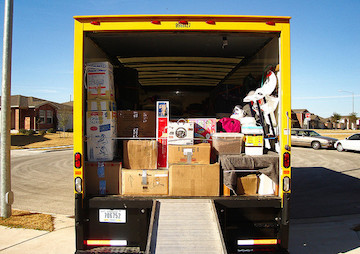Moving During Childhood Can Have Major Consequences Later in Life
A new study might make you think twice before picking up and leaving town if you have kids. TheMuuj / CC BY-SA 2.0
TheMuuj / CC BY-SA 2.0
By Robin Scher / AlterNet
This piece first appeared at AlterNet.
In 2014, according to a United States national census, more than 11% of Americans relocated across state borders. In our mobile society, this might seem like par for the course—no cause for alarm. But what about the effects such internal migration has on children later in life? Washington Post writer Christopher Ingraham recently asked this very question. His conclusion: In the long run, it’s bad for the kids.
For the article, Ingraham drew on the findings of a recent study published by the American Journal of Preventive Medicine that addressed the effects of moving one’s family around. In the study, a team of researchers conducted a comprehensive analysis using information gathered from everyone in Denmark born between 1971-1997 (which is only marginally less impressive when you consider that the country is around a third the size of New York state.) The team looked at the ratio rates of “attempted suicide, violent criminality, psychiatric illness, substance misuse, and natural and unnatural deaths” within this data set.
Their conclusion? Based on the “uniquely complete and accurate registration of all residential changes in [Denmark’s] population,” the team found that moving during childhood was directly tied to an increase in all of these measured negative outcomes later in life. And repeated moves in the course of a year — even worse. The team further found that children are most vulnerable at ages 12-14, with those who moved at 14 experiencing double the risk of suicide by middle age.
As Ingraham duly noted, however, while the study took into account parents’ income and psychiatric history as a control, the data was unable to provide information on the reasoning behind the moves. Ingraham illustrated this flaw by pointing to previous research conducted in the United States, which shows that beyond the act of moving itself, environment plays a far greater role in childhood development and its implications for adulthood. In other words, the positive effects of moving during childhood to a less violent neighborhood far outweigh any negative consequences. Of course, this oversight could also be attributed to Denmark having a generally lower rate of violent crime.
One of the study’s findings likely to carry more weight locally in the U.S. and abroad concerns the effects of changing schools. For these purposes, the study only considered moves across municipal boundaries, which meant a change in the child’s school district. Here the authors concluded:
“Relocated adolescents often face a double stress of adapting to an alien environment, a new school, and building new friendships and social networks, while simultaneously coping with the fundamental biological and developmental transitions that their peers also experience.”
Overall the results of the research are pretty damning. How much they directly apply contextually to other countries such as the United States is less clear. The study’s authors conceded that “the findings may not apply universally beyond Denmark, although it seems likely that they are relevant to other western societies with similar drivers of residential mobility.”
It seems pretty logical that changing one’s living environment during the onset of puberty could have lasting psychological consequences, and families that need to do so should take into account the hardship it presents to their growing children. Any direct link to higher risks of other negative consequences later on in life may be harder to establish.
(If these findings do hold true for the United States, we could be looking at a pretty depressing sequel to Inside Out.)
Robin Scher is a freelance writer from South Africa currently based in New York.
Your support is crucial…With an uncertain future and a new administration casting doubt on press freedoms, the danger is clear: The truth is at risk.
Now is the time to give. Your tax-deductible support allows us to dig deeper, delivering fearless investigative reporting and analysis that exposes what’s really happening — without compromise.
Stand with our courageous journalists. Donate today to protect a free press, uphold democracy and unearth untold stories.






You need to be a supporter to comment.
There are currently no responses to this article.
Be the first to respond.